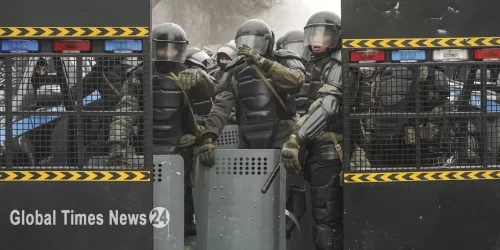Armenian police detained at least 200 anti-government protesters as the opposition shored up pressure on Prime Minister Nikol Pashinian over his policies following the Nagorno-Karabakh defeat.
Protests erupted in Yerevan on Sunday with the opposition demanding Pashinian's resignation accusing him of plotting to cede to Baku all the disputed Karabakh region over which the two countries went to war in 2020.
Fresh demonstrations took place on Monday and on Tuesday police cracked down on protesters who blocked traffic in central Yerevan, provoking chaotic scenes and the worst protests in the country since elections last September.
The interior ministry said "206 demonstrators were detained" in Yerevan and several provincial cities.
The protests highlight bitterness over Pashinian's leadership since the six-week war in 2020 that claimed more than 6,500 lives before ending with a Russian-brokered ceasefire agreement.
Armenia's security service warned Saturday of "a real threat of turmoil in the country," but Pashinian's ally and parliament speaker Alen Simonyan downplayed the risk of instability, insisting "there is no political crisis in Armenia."
"Political forces, which lost parliamentary elections in 2021, are aggressively trying to mount a wave of protests, but our citizens have already made their choice and will stay away from their attempts," he told a news conference Tuesday.
'Symbol of defeat'
Opposition leader and parliament vice-speaker Ishkhan Saghatelyan said: "Pashinian is a traitor and permanent street protests, which are mounting, will force him to resign."
He called for a protest rally later Tuesday in Yerevan's central Square of France where thousands rallied against Pashinian on Sunday and Monday.
"Nikol must go, he will go, because he is a symbol of defeat and Armenia has no future with such a leader," said 57-year-old blacksmith Sergei Hovhannisyan, one of the protesters.
"He is ready to give away Karabakh for which we have shed our blood," he told AFP.
Opposition parties accuse Pashinian of plans to give away all of Karabakh to Azerbaijan after he told lawmakers last month that the "international community calls on Armenia to scale down demands on Karabakh."
Relations between the former Soviet republics of Azerbaijan and Armenia have been tense since 1991 when the Armenian military occupied Nagorno-Karabakh, a territory internationally recognized as part of Azerbaijan, and seven adjacent regions. When new clashes erupted Sept. 27 last year, the Armenian army launched attacks on civilians and Azerbaijani forces, violating several humanitarian cease-fire agreements after the clashes erupted.
During the 44-day conflict, Azerbaijan liberated several cities and nearly 300 settlements and villages. On Nov. 10, 2020, the two countries signed a Russia-brokered agreement to end the fighting and work toward a comprehensive resolution.
The cease-fire is seen as a victory for Azerbaijan and a defeat for Armenia, whose armed forces withdrew in line with the agreement.
Under the Moscow-brokered deal, Armenia ceded swathes of territory it had controlled for decades, and Russia deployed some 2,000 peacekeepers to oversee the truce.
The pact was seen in Armenia as a national humiliation and sparked weeks of anti-government protests, leading Pashinian to call snap parliamentary polls which his party, Civil Contract, won last September.
News ID : 619
 Human rights groups call on UN to impose sanctions on Saudi Arabia
Human Rights / Breaking News
Human rights groups call on UN to impose sanctions on Saudi Arabia
Human Rights / Breaking News
 Ukraine investigating Belarus' involvement in forced transfer of minors
Human Rights / Breaking News
Ukraine investigating Belarus' involvement in forced transfer of minors
Human Rights / Breaking News
 Migrant teen from Honduras dies in US custody
Human Rights / Breaking News
Migrant teen from Honduras dies in US custody
Human Rights / Breaking News
 ‘Migrant deaths in central Mediterranean soar in 2023, UN agency warns’
Human Rights / Breaking News
‘Migrant deaths in central Mediterranean soar in 2023, UN agency warns’
Human Rights / Breaking News
 White House protesters demand Joe Biden do more to defend US abortion rights
Human Rights / Breaking News
White House protesters demand Joe Biden do more to defend US abortion rights
Human Rights / Breaking News
 On National Mourning Day, Azerbaijan remembers 147 civilians killed
Human Rights
On National Mourning Day, Azerbaijan remembers 147 civilians killed
Human Rights
 Global climate strikes, environmental protests in 2021
World
Global climate strikes, environmental protests in 2021
World
 Despite Biden's vows, Yemen starves
Human Rights
Despite Biden's vows, Yemen starves
Human Rights
 Russia-Allied Forces to Intervene as Unrest Sweeps Kazakhstan
World
Russia-Allied Forces to Intervene as Unrest Sweeps Kazakhstan
World
 How the FAA went to war against 5G
Technology
How the FAA went to war against 5G
Technology